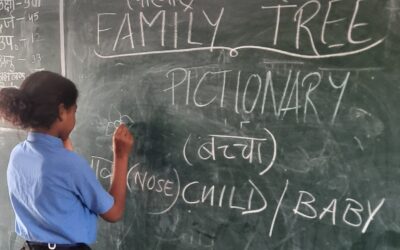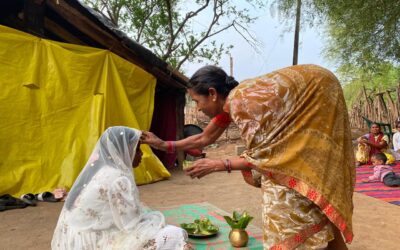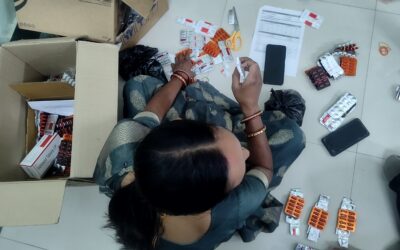Renu Devi was 7 months pregnant and expecting her second child. It was around midnight that she started having labour pains. She ignored the pain since her expected due date was two months away so she thought these must be false pains. Moreover, it was late at night and she didn’t want to bother her family unnecessarily. Gradually as morning came, her pain also increased. Her husband called the ASHA to arrange for a vehicle in which they could take her to the government hospital.
By the time the ASHA came, Renu’s water broke and she had already delivered a premature baby girl. The family started panicking and Renu’s husband went to call the local daai, but he was unable to find her. In this tense situation, Renu, who must be having terrible pain, kept her calm. She herself cut the umbilical cord and removed the placenta (a flattened organ in the uterus of a pregnant woman which nourishes the foetus through the umbilical cord). She then cleaned her newborn child and breastfed her. She did all of this on her own, with her nervous mother by her side to provide her with the materials like a blade and clean cloth.

This is the story of a courageous woman, someone who did not let fate play any role and showed her strength in spite of being in immense pain. Renu is an inspiration for all those women staying in rural areas who do not get proper medical facilities due to many reasons.
Deliveries at home are still common in villages but the absence of a Skilled Birth Attendant (SBA) during such deliveries can pose serious problems for the mother. A number of complications like heavy bleeding, high blood pressure or eclampisa and obstructed labour can pose serious threat to the mother and newborn and these cannot be managed at home. These complications can be taken care of in a well equipped medical facility with the presence of a SBA.
During the initial days of her pregnancy, Renu was staying with her husband in a village called Malpur in Bihar. There, the organisation in which I am working, Innovators In Health is running a maternal and neonatal health program (MNH). A major part of the program includes regular interactions with the community through meetings as well as individual counselling sessions for pregnant women and their families. The community meetings are organised once a month in each ward where the programme is being implemented. These meetings are called ‘Mahila Mandals’.
Women of all age group gather for these meetings including expecting mothers. Men were never excluded from these meetings but from the beginning it was seen that hardly any men attended them. The reasons included timings since the men were out for work or cultural issues like not sitting in the same place as women from other households are sitting. Another reason might have been the nature of the discussion in these meetings, since pregnancy is still considered solely as a woman related issue. Ideally, their presence would have been beneficial for the pregnant women since their husbands are the decision makers of the family. Very few women are independent enough to take health related decisions on their own.
Renu was a regular at such meetings where various issues regarding MNH were discussed. The topics included information regarding danger signs in pregnancy, healthy food habits, steps to be taken during emergency, different aspects of newborn care and so on. Renu was a common woman with basic education and very little knowledge on health issues. But she was always eager to learn. She was attentive during the Mahila Mandals and picked up the basics of safe delivery and newborn care which later helped her in saving not only her life but also her daughter’s life.
Many women like Renu have found such meetings quite informative and have used that knowledge for their benefit. The Mahila Mandal’s are not a place for one-way communication since the women are encouraged to share their experiences as well. This is done to ensure peer learning and to build their self confidence.
Recently I had a conversation with Renu and asked her to share her story. She smiled at first saying that what she did was nothing great but on my request she added, “I did not have any other option. I had to save my newborn. If I had waited for someone to come and take care of us then it would have been too late. My newborn was already premature and weak and every second was important for her. I was definitely in immense pain but I think God gave me that strength to get up and deliver my own baby.
I had heard during the Mahila Mandal that newborns must be breastfed immediately. So, that’s the first thing I did. I did everything that I could to help her survive. During the first six months she had respiratory and other health problems because of being premature. But with the help of Aahan (the name by which the local community knows Innovator’s In Health), my daughter had regular health check-ups in hospitals and now she is healthy. “My daughter is a fighter like me.” Renu’s family members are extremely proud of her and encourage her to continue going for the community meetings.
Renu has agreed to become a community counsellor and work with us to advice other women in her village. Her daughter is almost a year old now and healthy. She brings her along to the community meetings and continues to be an active learner. Renu wishes that all pregnant women in her village are well informed and well prepared for their delivery so that no one has to face difficult situations during their childbirth like she did.
*** Feature image captured during a Mahila Mandal meeting of Ahaan by Amrit Vatsa




0 Comments